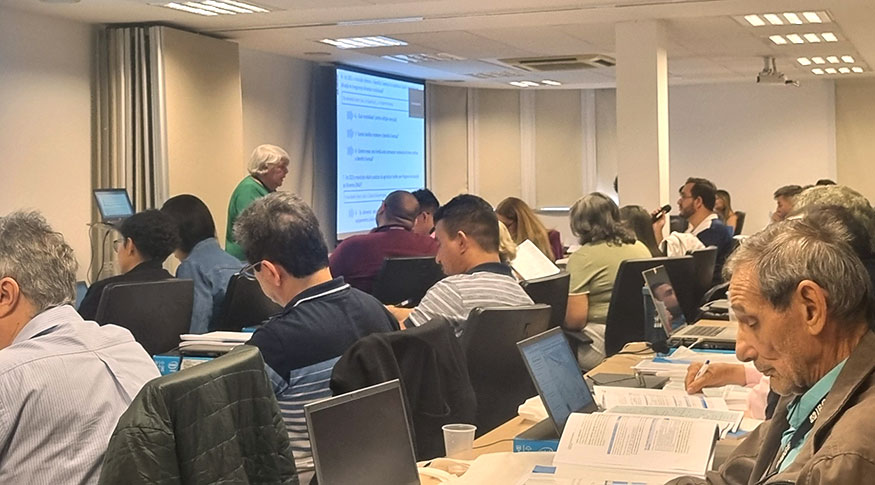Profile of States and Municipalities
Dozens of supervisors gather at IBGE headquarters for week of training on MUNIC and ESTADIC 2024
August 16, 2024 03h27 PM | Last Updated: August 19, 2024 02h10 AM

The IBGE conducted, between August 12 and 16, a workshop about the Survey of Basic Municipal Information (MUNIC) and the Survey of Basic State Information (ESTADIC) of 2024. About 60 servants representing state superintendencies of the Institute gathered at the headquarters of the Institute, in Rio de Janeiro, to receive guidance and discuss topics related to questionnaire answering. In the five-day-program, participants had a background study, received general guidance and discussed the thematic supplements of the surveys and watched a presentation about the data entry system.
Data collections for MUNIC and ESTADIC take place annually, except for the Years of the population Census, and will last from August 2024 to January 2025, with a tentative release date in September 2025.
Rosane Oliveira, manager of the surveys, praised the initiative, and highlighted the importance of being conducted face-to-face. “In-person training is essential. We have done it remotely twice, very successfully. But being there in-person one can feel more comfortable to speak than in remote sessions, since dynamism is reduced in this case. Being together in a place you can speak to a colleague beside you, during the break...that is not an expense, it is an investment, with a wonderful result,” says the researcher.
The State Superintendencies (SES) were asked to send two representatives – the survey supervisor, who is responsible for ESTADIC, and a technician directly involved in the data collection of MUNIC. When in their states, they will give the same training they have received. “It is the same slide, the same data collection material. That helps me with standardization,” Rosane Oliveira explains. The participation of SES representatives also helps in the improvement of the questionnaire, when possible. “The questions occasionally come from professionals in the data collection network themselves. Then we can make some changes, add some things to the questionnaire in order to help in data collection,” she adds, and recalls that the training is not the latest interaction between the managers and the data collection network. “Some Superintendencies meet remotely to discuss these issues, and we take part in that. If necessary, we all meet again online.”
Inclusion of a specific section on Racial equality stands out in 2024
One of the highlights in the survey is the inclusion of a specific section about Racial Equality. "It is something new because MUNIC never investigated this topic. And it included issues related to racial equality, but with other sections such as human rights and policies for women. This time, there will be a specific section for policies, programs and actions developed by municipalities and states. The training has also encompassed this piece of News,” said Vânia Pacheco, manager of the Coordination of Population and Social Indicators (Copis) of the IBGE. The section was developed in partnership with the Management Secretariat of the National System of Racial Equality Promotion of the Ministry of Racial Equality (MIR) with the objective of discussing and improving strategies for the promotion of technical studies and improve the actions of the System of Racial Equality Promotion. The training on this section had participations of representatives of MIR.
For Vânia, the regional sector and the different levels of technicians from city governments that answer MUNIC make the IBGE focus on standardized knowledge of questionnaires. “With all the data collection agents I understand the questionnaire and the concepts, the possibility of having a high-quality collection is much bigger.”
Mariana Pordeus, supervisor of surveys of SES of Pernambuco, praised the training. “It is very important, even more when in-person , because we can not only interact with the colleagues from other localities, but also get to know the peculiarities of each region and make some adjustments in the questionnaire, if it is the case, to try to adapt it in such a way as to make the question easier for the informant.” “There are different realities, in the capital, small municipalities, medium and big sized localities. Finally, this exchange of experiences, of ideas, will allow us to take it into the field the best way possible.
The contribution between supervisors was also a positive point mentioned by Pedro Marchezini, a data collection and quality supervisor in Bahia “I think a lot of the contribution comes from the Superintendencies to adjust the quality of the questionnaire, with suggestions of changes in the text, or to add some information in order to make the questionnaire as clear as possible for the informant. That is very positive.”




















